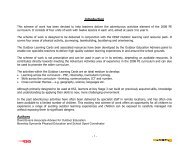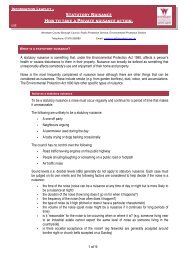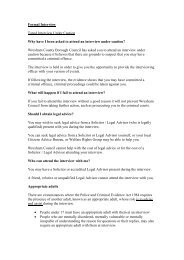Living With Urban Foxes Leaflet - PDF version 494Kb
Living With Urban Foxes Leaflet - PDF version 494Kb
Living With Urban Foxes Leaflet - PDF version 494Kb
- No tags were found...
Create successful ePaper yourself
Turn your PDF publications into a flip-book with our unique Google optimized e-Paper software.
If you live in an area where foxes frequent your garden, the onus is on you to take these very simpleprecautions to safeguard your pets.Do urban foxes have rabies?No. Rabies was eliminated from this country in the early part of the 19th century and Britain iscurrently one of only a few countries without rabies.Our quarantine laws are designed to keep rabies out and it will only reach Britain if someone smugglesin an infected animal.If that happens, there are well prepared contingency plans to prevent the disease becoming establishedin Britain.Will foxes rifle my dustbin?They will but much less frequently than most people suppose. That same survey in northwest Bristolfound that 81% of the residents never suffered this nuisance, 16% occasionally did but only 3% foundthis a regular problem. Even this figure is probably an overestimate, since many cases of riflingdustbins are wrongly attributed to foxes; cats and dogs do it very regularly and perhaps more frequentlythan foxes. If you do suffer from foxes turning out your dustbin, the solution is easy. Buy an elasticisedstrap with a hook at each end (they are available from garages or motorists' accessory shops), put itthrough the dustbin lid and hook it over the handle on each side. That cures the problem, whether it isdue to foxes, cats or dogs, very quickly and simply.If you suffer from having your dustbin sacks ripped open on the night you put them out for collection,then you have no alternative except to put them out the following morning. If you leave a plastic bagfull of tasty food remains sitting on the pavement overnight, you cannot be too surprised if somepassing animal is tempted to tuck in.Should I feed the foxes?If you want to, yes; there is absolutely no reason why you should not feed them and many people drivea great deal of pleasure from feeding the foxes in their garden. But do not feel that you have to feedthem because otherwise they will be short of food. This is not true.For instance, some people believe that wheelie bins are stopping foxes feeding from bins and as aconsequence they are starving. Since foxes rarely scavenge from dustbins, they introduction of wheeliebins is hardly likely to be a problem.Other people believe that foxes are particularly short of food in the winter and so need feeding. Againthis is a fallacy, as winter poses no problem for foxes.If you decide to feed your foxes, resist the urge to make them too tame. <strong>Urban</strong> foxes already are prettytolerant of humans and show none of the natural fear of rural foxes. This means that it is
comparatively easy to get the foxes to come and take food from your hand or even come indoors to befed. One person even had a fox that would come indoors, sit on her lap and allow itself to be stroked.This often causes great problems, both for the fox and for other local residents. The fox assumes thatall people will react in the same way and may approach people for food who are either scared of it orlikely to be aggressive towards the fox. Sometimes these very tame foxes enter houses through cat-flapsin search of food, much to the consternation of the householder and the cat. If the fox panics andcannot find its way out quickly, bedlam ensues and great damage can be caused in the kitchen.A new development to the traditional cat-flap is now available that reacts to a device carried on yourcat's collar, so that the flap will only allow your cat entry, thereby preventing dogs, foxes or other catsentering your house.Finally, some people are afraid of foxes and to be approached by an apparently fearless wild animalcauses them a great deal of distress.So avoid making your fox too tame or too bold.Can I stop the foxes making those awful screaming noises?Unfortunately no. <strong>Foxes</strong> live in family groups that defend a joint territory but since they normallyspend much of the time travelling around the territory alone, they use calls to maintain contact withother members of the family group and to warn off intruders. Although foxes vocalise throughout theyear, their calls are most obvious during the mating season, around January and February. It is thentheir barks and screams are most likely to be heard; fortunately the calls are usually short-lived andthings quieten down fairly quickly.Do urban foxes get mange?In some cities, yes. Mange is caused by the itch mite Sarcoptes scabiei, which burrows into the skin.Exactly the same mite causes mange in dogs and scabies in humans. In some rural and urban areas,mange is currently prevalent in foxes; it is very virulent and infected animals invariably die.People often see foxes that look very thin and with their fur coming out in great tufts, so that they lookalmost hairless. In fact it is very different and a normal course of events.<strong>Foxes</strong> moult once a year; this starts around April and they lose much of their fur, so they lookextremely thin and scruffy. Often only the grey underfur is left, so that they have large grey patches onthe shoulders or flanks.The new winter coat grows throughout the summer and this process is usually only completed inSeptember or October.Can I stop the foxes stealing objects from my garden?
<strong>Foxes</strong> are both inquisitive and very playful like dogs. This means they are not only scent mark objectsthat interest them but are also quite likely to play with or chew them.Gardening shoes, gardening gloves, anything made of leather, balls left in the garden, dog chews another pet toys and clothes hanging on washing lines are all played with, chewed or in the late spring /early summer, removed to take back to the earth for the cubs to play with.The only recourse is to ensure that you do not leave such items in your garden overnight if foxesfrequent the area.Why do foxes foul my garden?<strong>Foxes</strong> use faeces to mark their territory; that is why the faeces are always left in conspicuous places, eg:on top of a compost heap or on garden walls. Excessive fouling is often due to immature foxesattempting to create their territories or where several foxes are competing for a vacant territory.Once a fox has established a route through your garden, it can be very difficult to stop it. An adult foxcan pass through a hole 4" (10cm) square and can scale a 6ft (2m) fence or wall with ease.It is extremely difficult to stop foxes passing through your garden. Any measures taken are best carriedout during late summer and autumn. This is the time that cubs become more adventurous, the familygroups are starting to break up and the foxes are endeavouring to establish new territories.It is rare for this nuisance to be anything more than occasional and although fox faeces are very smelly,they pose little disease risk. <strong>Foxes</strong> are prone to many of the same diseases and parasites as domesticdogs, including the roundworm Toxocara canis, the larvae of which can cause blindness in children.However, the chance of catching this from foxes is remote and so far there are no known cases ofchildren contracting toxocariasis from foxes.Can I stop foxes digging up my lawn?Yes, this is comparatively easy. <strong>Foxes</strong> dig shallow holes in lawns, bowling greens or playing fields whenthey are hunting for earthworms and grubs; they eat a large number of cutworms (the caterpillars ofmoths) and beetle larvae, such as wireworms. These only come near the surface of the lawn in wetperiods and so this sort of damage is seasonal. It occurs mainly in wet springs and warm wet autumns.If the damage is not too severe you can ignore it and it will cease as soon as the weather changes. Youcan then repair the lawn. Otherwise, you can remove the grubs and earthworms in the lawn using acommercially available insecticide and vermicide available from garden centres and DIY stores. Thiscourse of action should only be considered in extreme circumstances, due to the need to reduce the useof all pesticides in the environment.Very occasionally, foxes dig much deeper holes in lawns or bowling greens. These can sometimes behalf a metre or more deep and the lawn looks like a battlefield. This usually occurs when a blood orbone-based fertiliser has been applied to the lawn. The foxes think there is a corpse and beingscavengers, frantically dig to find it. All you can do is wait for the rain to wash the fertiliser deeper so
that they cannot smell it, or if it is a bowling green or similar area, fence it against the foxes with a smallelectric fence.This may sound like a drastic resort but in fact is fairly cheap and easy. All you need is a length ofrabbit or sheep "flexinet" and an energiser, which can be run off a 12-volt car battery. They areobtainable from any agricultural merchant - look in the "Yellow Pages". An electric fence can also beused when foxes persistently damage fruit or vegetable gardens.However, remember that you must clearly label the electric fence, even if it is on private property andmust not erect it in an area with public access. You are responsible for the safety of the fence you putup.This type of fence is likely to cost £100 and so is only really appropriate for extremely sensitive areassuch as bowling greens.Why do foxes dig burrows in my garden?This is difficult to answer. <strong>Foxes</strong> are always exploring and often dig trial burrow systems in a variety ofunusual places. Flower beds, compost heaps, under garages or under garden paths are all favouredsites.Often these burrows are less than a metre long and are never used. However, they are a nuisance.As soon as you spot such a hole, get a bamboo pole and poke it down the hole to the end to checkthere is no animal in it. Invariably there will not be. Then fill the hole with bricks or something that isdifficult for the foxes to dig out and cover it with soil.Frequently, perhaps inevitably the foxes will try to open it up again but after a few re-blockings, theywill give up and go away.How can I stop fox cubs trampling my garden?Sometimes fox cubs may be living in an adjacent property but playing in your garden, trampling flowerbeds, stealing washing off lines, jumping on and breaking cloches or getting entangled in gardennetting. Invariably the cubs play very close to their earth and so they will be living a few metres away,under a neighbour's shed or in a patch of rank vegetation.If they are living in a neighbour's garden, you can ask your neighbour to encourage the foxes to moveon. But if your neighbour welcomes the foxes, there is little that you can do, since anyone is perfectly atliberty to encourage foxes to live in their garden. Then all you can do is try to block the access pointsto your garden so that the cubs play elsewhere.Sometimes, particularly in late summer, the cubs are coming from a patch of dense vegetation (oftenbrambles) in an adjacent allotment or an overgrown garden. To get the foxes to move, all that has to bedone is to clear the area in which they are living.
What can I do about the foxes living under my shed or garage?<strong>Foxes</strong> like garden sheds; they provide a nice dry lying up site and an ideal place to breed. Sheds thathave proved good breeding sites are used time and again. But it is very easy to stop this.<strong>Foxes</strong> do not like sheds that have draughts under them and usually use ones that are in the corner ofthe garden with a wall or fence on two sides. If there is rubbish piled behind the shed, then so muchthe better. To deter the foxes, all you have to do is clear the rubbish and open up the area around theshed so that it is exposed and draughty. The foxes will leave pretty quickly, usually the following night.As soon as they have gone, take steps to prevent them returning. If you have exposed the shed so thatit is open all round, this is usually enough. If you want to be absolutely sure that they will not comeback, securely fix weld mesh (not chicken wire) around the bottom of the shed, covering the gap anddug about 12 inches (30cm) into the soil.<strong>Foxes</strong> breeding under garages are more difficult to get out, since they will have burrowed under aconcrete floor. Putting foul-smelling chemicals down the holes is currently illegal under the Food andEnvironment Protection Act 1985 and often the only way to get them out is to break up the concretefloor of the garage. This is a drastic course of action, particularly since the nuisance value is far lessthan if they were under the house.The best course of action is to leave well alone until the foxes take their cubs away; in most years, thishappens during June. When you think the foxes have gone, loosely block the holes with some soil. Ifthe holes are re-opened, continue each day until nothing touches the plugs. Then immediately fill theholes with rubble and cement them over to prevent the foxes gaining access again.In future years, look for new holes and block these in the same way as soon as they appear.What can I do about the foxes living under my house?This is a rare but serious problem that must be dealt with immediately. If they can get in under houses,foxes find the nice dry warm environment ideal and often have their cubs in such situations.It occurs most commonly in older houses, which have large spaces under the floorboard and old metalair vents to provide ventilation. These metal air vents may have rusted away, allowing the foxes easyaccess. Once in, the space under the floors is divided by walls with small gaps in them to allow air toflow and so this gives the foxes access under the whole house.The problem is particularly severe in the breeding season and if cubs are born under your house, thereare a number of problems. At night the cubs chase each other round and round under the wholehouse, screaming and wickering at each other.Not only is the noise unbelievable but under the house is very dry and the dust they kick up permeateseverywhere. In addition, they urinate and defecate under the house, so that the smell is awful. To addto this, the vixen brings home food for the cubs; this decomposes, smells and attracts flies. To cap itall, remember that foxes like to chew things and under your house these include gas and water pipes,
electricity and telephone cables. Severe gas leaks, floods, electrical fires and telephone faults have allbeen caused by foxes.The most sensible course of action is not to let your air bricks get into a bad state of repair. If the foxesdon't take advantage, the local cats will and these can cause very similar problems.If the foxes have got in, all you can do is arrange for a pest control company to life the floorboards anddrive the foxes out. However, since the foxes probably have access under the whole house, this maywell involve lifting floorboard in every room.Getting the foxes out an be a very time consuming, difficult, disruptive and expensive operation.Maintaining your airbricks is much simpler.Practical adviceIf you are unfortunate to have foxes in your garden, then the following advice can be considered:- Remove the attraction.- Habitats.- Make it unacceptable to the fox.Remove the attractionThis method can produce the greatest control over the fox population at little or no cost.<strong>Urban</strong> fox populations are far greater than those in rural areas, mainly due to the fact that a far greateramount of food is readily available. The most likely reason for a fox to enter your garden is in thesearch for food, removal of the food source will reduce the attractiveness of your garden to the fox.Suggestions of action you can take:1. Keep all domestic refuse in wheelie bins or closed containers, NOT plastic bags.2. Only put your refuse out on the morning of collection.3. Protect all animals and livestock.4. Do not leave food out for other animals, eg: cats, dogs, rabbits, etc. Be extremely careful whereyou put food to feed birds; this should be in approved containers.HabitatsAnother reason for foxes being attracted to your garden is that it can provide a safe place to shelter byday or night. This may be overgrown or neglected areas or a void beneath a building. Voids can beprotected using heavy-duty mesh (weld mesh). Holes measuring 2" (50mm) square are ideal, makingsure that it is securely fixed to any building and buried to a depth of 12" (30cm) into the soil to preventthe fox burrowing under the mesh.
Making it unacceptableIf you decide that the presence of foxes in your garden is genuinely unacceptable, then there are waysof discouraging them, although none are foolproof.To prevent foxes using your garden, you can try a suitable proprietary animal repellent. A range ofproducts are available from garden centres, hardware and DIY stores but please note only approvedproducts can be used and they must be used in accordance with the manufacturers' instructions. Theuse of non-approved products such as creosote and diesel oil is not permitted by law. The use of thesetypes of non-approved products can be very dangerous to other pets such as cats and dogs.Prosecutions can result against anyone who is found using such products.Your local garden centre, hardware or DIY store should be able to provide you with the correct adviceon the most suitable product to use. Scoot, containing aluminium ammonium sulphate, is currentlyapproved for use. Alternatively, you can purchase a scent neutraliser called Cat Off. This productreduces and neutralises the scents left behind by the fox from its faeces or urine.Please noteAny chemical used as a repellent is covered under The Control of Pesticides Regulations 1986 where itstates, that only approved chemicals may be used.All chemicals must be used safely and in accordance with the manufacturers' recommendations.Further helpIf you require further help or advice, you may find a phone call to the Fox Deterrence Helpline 0906272 4411 (25p per minute) will prove invaluable. Although the Fox Project is a wildlife group, theyhave developed a wealth of knowledge and expertise on fox deterrence. Their advice will varyaccording to the time of year and can also be tailored to your own particular situation.It may be possible to resolve the problem without controlling the foxes. Advice on how to achieve thiscan be obtained from the following source:National Fox Welfare Society135 Higham RoadRushdenNorthants NN10 6DSTel: 01933 411996Fax: 01933 397324Email: martin@nfws.org.uk Web site: www.nfws.org.ukCIEH. January 2002
















